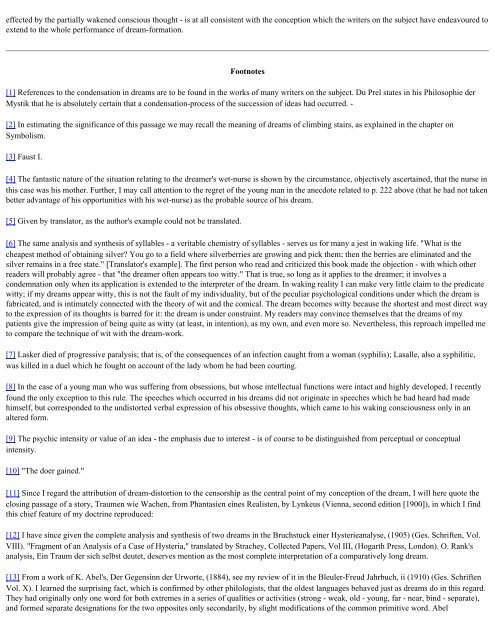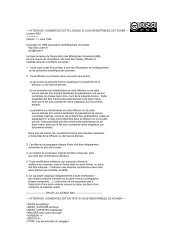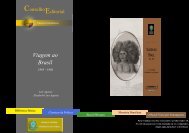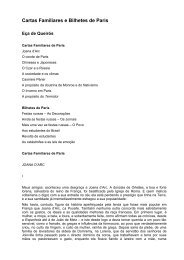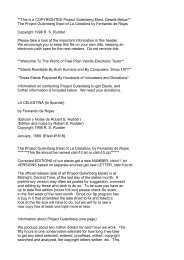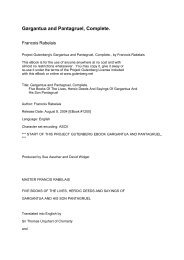The Interpretation of Dreams Sigmund Freud (1900)
The Interpretation of Dreams Sigmund Freud (1900)
The Interpretation of Dreams Sigmund Freud (1900)
You also want an ePaper? Increase the reach of your titles
YUMPU automatically turns print PDFs into web optimized ePapers that Google loves.
effected by the partially wakened conscious thought - is at all consistent with the conception which the writers on the subject have endeavoured to<br />
extend to the whole performance <strong>of</strong> dream-formation.<br />
Footnotes<br />
[1] References to the condensation in dreams are to be found in the works <strong>of</strong> many writers on the subject. Du Prel states in his Philosophie der<br />
Mystik that he is absolutely certain that a condensation-process <strong>of</strong> the succession <strong>of</strong> ideas had occurred. -<br />
[2] In estimating the significance <strong>of</strong> this passage we may recall the meaning <strong>of</strong> dreams <strong>of</strong> climbing stairs, as explained in the chapter on<br />
Symbolism.<br />
[3] Faust I.<br />
[4] <strong>The</strong> fantastic nature <strong>of</strong> the situation relating to the dreamer's wet-nurse is shown by the circumstance, objectively ascertained, that the nurse in<br />
this case was his mother. Further, I may call attention to the regret <strong>of</strong> the young man in the anecdote related to p. 222 above (that he had not taken<br />
better advantage <strong>of</strong> his opportunities with his wet-nurse) as the probable source <strong>of</strong> his dream.<br />
[5] Given by translator, as the author's example could not be translated.<br />
[6] <strong>The</strong> same analysis and synthesis <strong>of</strong> syllables - a veritable chemistry <strong>of</strong> syllables - serves us for many a jest in waking life. "What is the<br />
cheapest method <strong>of</strong> obtaining silver? You go to a field where silverberries are growing and pick them; then the berries are eliminated and the<br />
silver remains in a free state." [Translator's example]. <strong>The</strong> first person who read and criticized this book made the objection - with which other<br />
readers will probably agree - that "the dreamer <strong>of</strong>ten appears too witty." That is true, so long as it applies to the dreamer; it involves a<br />
condemnation only when its application is extended to the interpreter <strong>of</strong> the dream. In waking reality I can make very little claim to the predicate<br />
witty; if my dreams appear witty, this is not the fault <strong>of</strong> my individuality, but <strong>of</strong> the peculiar psychological conditions under which the dream is<br />
fabricated, and is intimately connected with the theory <strong>of</strong> wit and the comical. <strong>The</strong> dream becomes witty because the shortest and most direct way<br />
to the expression <strong>of</strong> its thoughts is barred for it: the dream is under constraint. My readers may convince themselves that the dreams <strong>of</strong> my<br />
patients give the impression <strong>of</strong> being quite as witty (at least, in intention), as my own, and even more so. Nevertheless, this reproach impelled me<br />
to compare the technique <strong>of</strong> wit with the dream-work.<br />
[7] Lasker died <strong>of</strong> progressive paralysis; that is, <strong>of</strong> the consequences <strong>of</strong> an infection caught from a woman (syphilis); Lasalle, also a syphilitic,<br />
was killed in a duel which he fought on account <strong>of</strong> the lady whom he had been courting.<br />
[8] In the case <strong>of</strong> a young man who was suffering from obsessions, but whose intellectual functions were intact and highly developed, I recently<br />
found the only exception to this rule. <strong>The</strong> speeches which occurred in his dreams did not originate in speeches which he had heard had made<br />
himself, but corresponded to the undistorted verbal expression <strong>of</strong> his obsessive thoughts, which came to his waking consciousness only in an<br />
altered form.<br />
[9] <strong>The</strong> psychic intensity or value <strong>of</strong> an idea - the emphasis due to interest - is <strong>of</strong> course to be distinguished from perceptual or conceptual<br />
intensity.<br />
[10] "<strong>The</strong> doer gained."<br />
[11] Since I regard the attribution <strong>of</strong> dream-distortion to the censorship as the central point <strong>of</strong> my conception <strong>of</strong> the dream, I will here quote the<br />
closing passage <strong>of</strong> a story, Traumen wie Wachen, from Phantasien eines Realisten, by Lynkeus (Vienna, second edition [<strong>1900</strong>]), in which I find<br />
this chief feature <strong>of</strong> my doctrine reproduced:<br />
[12] I have since given the complete analysis and synthesis <strong>of</strong> two dreams in the Bruchstuck einer Hysterieanalyse, (1905) (Ges. Schriften, Vol.<br />
VIII). "Fragment <strong>of</strong> an Analysis <strong>of</strong> a Case <strong>of</strong> Hysteria," translated by Strachey, Collected Papers, Vol III, (Hogarth Press, London). O. Rank's<br />
analysis, Ein Traum der sich selbst deutet, deserves mention as the most complete interpretation <strong>of</strong> a comparatively long dream.<br />
[13] From a work <strong>of</strong> K. Abel's, Der Gegensinn der Urworte, (1884), see my review <strong>of</strong> it in the Bleuler-<strong>Freud</strong> Jahrbuch, ii (1910) (Ges. Schriften<br />
Vol. X). I learned the surprising fact, which is confirmed by other philologists, that the oldest languages behaved just as dreams do in this regard.<br />
<strong>The</strong>y had originally only one word for both extremes in a series <strong>of</strong> qualities or activities (strong - weak, old - young, far - near, bind - separate),<br />
and formed separate designations for the two opposites only secondarily, by slight modifications <strong>of</strong> the common primitive word. Abel


